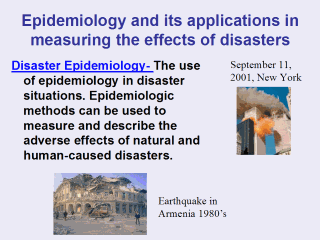| front |1 |2 |3 |4 |5 |6 |7 |8 |9 |10 |11 |12 |13 |14 |15 |16 |review |
 |
Similarly, epidemiologic methods can be used to measure and describe the adverse health effects of natural and human-caused disasters and the factors that contribute to those effects; the overall objective of such epidemiologic investigations is to Assess the needs of disaster-affected populations, match available resources to needs, prevent further adverse health effects, evaluate program effectiveness, and permit better contingency planning. By identifying risk factors for specific outcomes as a s death and injury, epidemiologists can help develop effective strategies to prevent future disaster-related morbidity and mortality. In addition, epidemiologists play an important role in providing informed advice about the probable future health effects of a disaster, in establishing priorities for action by public health authorities, and in emphasizing the need for valid and timely data collection and analysis as the basis of immediate decision-making. |